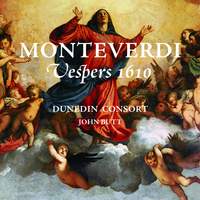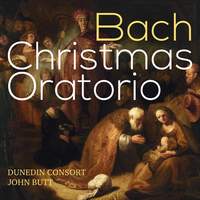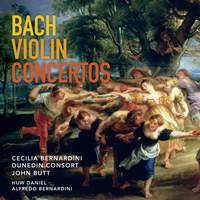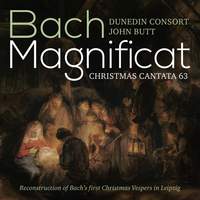Interview,
John Butt on Monteverdi's Vespers 1610
 The Dunedin Consort have produced a string of highly acclaimed recordings of Bach's major choral works, with pared-down vocal forces and a keen eye for historical detail. Their latest album takes them back to 1610 for Monteverdi's celebrated Vespro della Beata Vergine, ably assisted by the instrumentalists of His Majestys Sagbutts and Cornetts; I caught up with the Consort's conductor John Butt to talk about this new disc, and some of the approaches he's explored in pursuit of an authentic sound.
The Dunedin Consort have produced a string of highly acclaimed recordings of Bach's major choral works, with pared-down vocal forces and a keen eye for historical detail. Their latest album takes them back to 1610 for Monteverdi's celebrated Vespro della Beata Vergine, ably assisted by the instrumentalists of His Majestys Sagbutts and Cornetts; I caught up with the Consort's conductor John Butt to talk about this new disc, and some of the approaches he's explored in pursuit of an authentic sound.
The Dunedin Consort’s reputation rests mostly on your acclaimed recordings of Bach and other Baroque composers. What led you to venture so far back into the past with this album?
Well, music stretching back to the late sixteenth century, and indeed to the end of the eighteenth has always been part of our performing repertory. We have done quite a lot of Monteverdi – both late and early madrigals and the church music - and we frequently perform the music of Heinrich Schütz. We did a couple of performances of the 1610 Vespers last year (one of which was nominated for a Sky South Bank Award) so we thought that in this Monteverdi year it would be good to capture the piece while it was still vividly in our collective memory. I have also been doing a little research into the Vespers, to be published in an article next year, so the piece has very much been part of my thought processes over the last few years.
This recording uses the Hauptwerk ‘virtual organ’ system to reproduce the sounds of an authentic Venetian instrument that cannot be physically relocated. Can you tell us a little more about this ingenious arrangement?
This is a programme and system that has been around for at least a decade now – it wasn’t possible before since it requires so much memory, hence the older concept of computer organs and synthesisers (which sample a certain number of notes and then generate from these the entire array – with moderately good, but blatantly synthetic, results). With Hauptwerk, it is essentially like having a recording of every pipe (and sometimes the associated clicks), so it’s essentially the same sound as a good organ recording, but one where the player is essentially playing the entire organ rather than a recorded organist. I’m just on my way back from doing a concert on the wonderful German Baroque organ at Waltershausen – I have a ‘copy’ of this organ at home so I was fully familiar with its sounds and layout before arriving. The experience was quite uncanny from an aural point of view although the original organ is extremely difficult to play owing the weight of the action (so the main experiential loss with Hauptwerk is the physical difference between different organs, not so much the actual sound).
In your notes you view Monteverdi’s 1610 Vespers music as having a kind of independent existence, above and beyond its practical liturgical function, and as somehow ‘summing up’ key elements of the ritual experience of Vespers in a more abstract way that pushes it a little towards being a concert work. Do you think this affects how you approach the performance itself?
Yes, in many ways – on the one hand, I was keen on experimenting with what we know of the various ‘live’ performance practices but I was also keen to try and show how the work has a sort of integrity that goes over and above any liturgical function. It’s really a matter of approach (and discussing with the performers the way the music ‘doubles’ the liturgy from which it comes, including aspects of the way we hear and mis-hear it) rather than a definitive range of strategies.
You clearly take very seriously the need to present a performance informed by correct historical scholarship on notation, pitch, instrumentation and so forth – do you worry that a given recording such as this one may become ‘obsolete’ (as earlier, groundbreaking recordings of early music have in a sense done) as a result of new research that changes how we view the music of this period?
There are always going to be new ways of interpreting historical evidence, even if the actual ‘data’ doesn’t change that much. Each new performance and each new experience, together with each new examination of the sources, changes the picture in some very subtle but real ways. I never think of historical performance as merely aiming for accuracy (and how would we know once we’d got it right?). Rather, I’m interested in learning as much of the historical circumstances as I can in order to understand something of the sound world that Monteverdi experienced and the ways in which the possibilities and limitations of his performing environment actually influenced what he wrote (such as – and I think this is very important – his experience of actual singers and the way their voices articulated). With this sort of attitude there is no ‘correct’ answer, rather an ever changing constellation of factors that both performers and listeners experience over time in our ongoing present. If historical performance doesn’t help to generate new life in the performances of old music I don’t think it’s really worth the effort.
John Butt's recording of the 1610 Vespers with the Dunedin Consort was released on Linn on 8th September.
Available Formats: 2 CDs, MP3, FLAC, Hi-Res FLAC
Recent recordings by the Dunedin Consort
'This red hot interpretation of the six cantatas that make up Bach's Christmas Oratorio holds the attention from the word go. The opening chorus, Jauchzet frohlocket, hits you like a lightning bolt, Butt's infectious energy and exhilarating musicianship infusing Bach's joyous music with utterly compelling brilliance.' (The Scotsman)
Available Formats: MP3, FLAC, Hi-Res FLAC
'Neat, stylish and uncomplicated performances in a recording of beautifully judged clarity and resonance...[Bernardini] shows that these familiar pieces still have plenty to say if you just play them with the right balance of technique, tone and musicality. [The Dunedins] show here that a light interpretative touch does not have to be a casual one.' (Gramophone)
Available Formats: MP3, FLAC, Hi-Res FLAC
'A very good example of John Butt’s marriage between arresting scholarship, enormous musicality – the tempi are so naturally right – and pragmatic skills: conceiving and bringing such a complex production to fruition is a huge task, and the whole disc is so coherently musical from the word go...Bach at its very best.' (Early Music Magazine)
Available Formats: MP3, FLAC, Hi-Res FLAC






